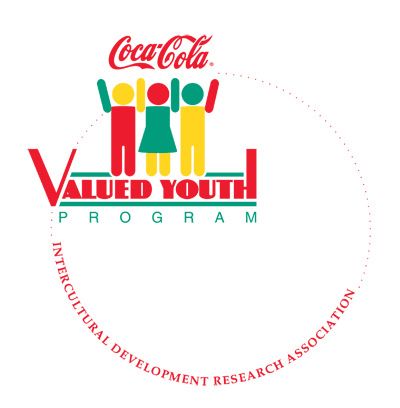• IDRA Newsletter • May 2009
 IDRA’s Coca-Cola Valued Youth Program is celebrating its 25th anniversary in the United States as well as its 10th anniversary in Brazil. To celebrate these two milestones, IDRA sponsored an essay contest in the United States. Six students received prizes. The grand prize winner, whose essay is below, won an opportunity to represent all U.S. program sites at the Coca-Cola Valued Youth Program Brazil’s 10th Anniversary Celebration in Rio de Janeiro for herself, her mother, Jamie Starkey Guajardo, and the teacher coordinator, Mr. Lee Ramos, from South San Antonio High School. The celebration was held in April 2009.
IDRA’s Coca-Cola Valued Youth Program is celebrating its 25th anniversary in the United States as well as its 10th anniversary in Brazil. To celebrate these two milestones, IDRA sponsored an essay contest in the United States. Six students received prizes. The grand prize winner, whose essay is below, won an opportunity to represent all U.S. program sites at the Coca-Cola Valued Youth Program Brazil’s 10th Anniversary Celebration in Rio de Janeiro for herself, her mother, Jamie Starkey Guajardo, and the teacher coordinator, Mr. Lee Ramos, from South San Antonio High School. The celebration was held in April 2009.
Since I became a tutor…
by Gabriella Marie Guajardo, 12th grade, South San Antonio High School

Since I became a tutor, I’ve been overwhelmed with excitement. Meeting my students lets me know that my life has changed and will not ever be the same without them.
I mentor a classroom of seven; each of them has a learning disability. In my eyes, I do not see anything wrong with them. When the Coca-Cola Valued Youth Program tutors first started visiting the classes and trying to figure out where my classmates and I would get placed, my teacher told me I was going to the class for children with learning disabilities (PPCD).
When I asked him why he placed me there, the instant he told me, I knew it was my place. Mr. Ramos simply said to me: “Those kids are the kids that don’t get recognized. They’re not paid attention to because they’re different than most kids. You have that optimistic personality that would bring them out of their shells and show them acceptance that most people do not. I believe that when this year comes to an end, you will have made such an impact on those children, such a difference. When this year finishes, you will know deep down inside your heart that those kids will never forget you. Wouldn’t that make you feel good? How does that make you feel?”
To hear him say that to me lets me know that I can do it. I can put my mind to it and further myself by knowing that I have the support behind me, pushing and giving me the assurance.
My children, my class, my tutees have taught me that it is acceptable to not be perfect, because nobody is. For just being in the age group of 3, 4 and 5, their knowledge for looking at the small things in life astounds me in ways that I never thought possible. I look back on a particular day when I was outside with them, and Casey*, one of my three tutees, came up to me with a pink blossomed flower in hand and said, “This flower beautiful, Gabby.” I looked at her and smiled “Like you,” I said to her. “Like us,” she smiled and then went to catch a multi-colored butterfly. I simply chuckled to myself as she went about, arms extended out; attempting to give the effect of that same butterfly she was following.
A simple object, like a butterfly or a flower to us is like my class’ fantasy. The playground is a place for us to relax. To them it is an alternative world where they can be anything they want to be: A butterfly for Casey; A place where Mason* can jump off the merry-go-round and scream “Super Man!” at the top of his lungs. They ask me to play along, and I imagine that I’m a kid again bundled up in my jacket, making snow angels in the dirt. I sit up from being on the ground with my class, and I think back. Wow. Pure Nirvana. I look at my watch and notice that it’s time for me to go: I lift myself up and tell everyone good-bye. Casey walks over to me and whispers in my ear, “Tomorrow, we’ll be angels.” She gives me a big hug, and we go our separate ways. As I’m walking with my class I tell myself, since I became a tutor, life to me has endless possibilities, dreams and goals that I can accomplish when I just sit down, relax and look at the small things in life.
*name changed for privacy
Comments and questions may be directed to IDRA via e-mail at feedback@idra.org.
[©2009, IDRA. This article originally appeared in the May 2009 IDRA Newsletter by the Intercultural Development Research Association. Permission to reproduce this article is granted provided the article is reprinted in its entirety and proper credit is given to IDRA and the author.]



